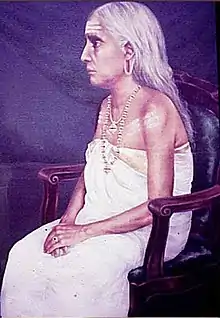Kutty Kunju Thankachi
Lakshmy Pilla (14 February 1820 – 13 February 1904), better identified as Kutti Kunju Thankachi, was an Indian composer and writer of Malayalam literature, known to be the first female poet and composer of Kerala. The daughter of Irayimman Thampi, the noted composer of Omanathinkal Kidavo and a musician at the court of Swathi Thirunal, she was the author of a number of attakathas such as Parvathiswayamvaram and Mithrasahamoksham. Sreemathy Swayamvaram and a play, Ajnathavasam.
Kutti Kunju Thankachi | |
|---|---|
 | |
| Born | Lakshmy Pilla 14 February 1820 Vilavancode taluk, Travancore, India |
| Died | 13 February 1904 (aged 83) Travancore |
| Occupation(s) | Poet, playwright, composer |
| Spouse(s) | Kunjan Thamban, Kunjunni Thamban |
| Children | Eight children |
| Parents |
|
Biography
Kutti Kunju Thankachi, née Lakshmy Pilla, was born on 14 February 1820 at Vilavancode taluk of the Travancore state, presently in Kanyakumari district of the south Indian state of Tamil Nadu, to Irayimman Thampi and Kalipilla Thankachi.[1] Her early education was under her father;[note 1] she studied under Harippadu Kochuppilla Varrier, simultaneously learning Thiruvathira dance from her father.[3] Her first marriage was in 1834 to Kunjan Thampan of Cherthala Varanadu Naduvilel Kovilakam but after the death of Thampan in 1851, she married again in 1861; the marriage with Kunjunni Thampan lasting a decade until his death in 1871. She had eight children, from her two marriages. She was afflicted with eye disease from her childhood, lost her eye sight completely by 1902 and died on 13 February 1904, at the age of 83.[1]
Legacy
Thankachi, known to be the first woman poet[4] and composer of Kerala,[3] wrote eighteen books comprising three attakathas, Parvathiswayamvaram, Mithrasahamoksham and Sreemathy Swayamvaram,[5] several poems, two kurathi songs, a thullal and a play, Ajnathavasam.[6] Noted critic, S. Gupthan Nair, has stated that Thankachi had gained popularity as a poet during her time itself and people used to visit her to read their poems to listen to her opinions.[7] She was known to have good knowledge of Sanskrit and she composed songs in several ragas such as Kambhoji, Kalyaani, Naatta, Khamas and Surutti.[8][9]
Literary contributions
| No. | Work | Genre |
|---|---|---|
| 1 | Shivaraari Mahatmyam | Thiruvathira songs |
| 2 | Seetha Swayamvaram' | Thiruvathira songs |
| 3 | Narada Mohanam | Thiruvathira songs |
| 4 | Thiruvananthapuram Sthalapuranam | Kilippattu |
| 5 | Vaikom Sthalapuranam | Kilippattu |
| 6 | Kiratham | Kurathipattu (folk song) |
| 7 | Nalacharitham | Kurathipattu (folk song) |
| 8 | Ganga Snanam | Tullal |
| 9 | Parvathiswayamvaram | Attakatha |
| 10 | Mithrasahamoksham | Attakatha |
| 11 | Sreemathy Swayamvaram | Attakatha |
| 12 | Anchita Saubhagya Lakshmi (for Princess Vanchi) | Tharattu (lullaby) |
| 13 | Ajnathavasam | Play |
| 14 | Asharavamsha Dinesha Vibho | Kummi (folk song) |
Musical compositions
| Work | Language | Raga | Tala | Remarks |
|---|---|---|---|---|
| Katyayan mam palaya | Malayalam | Kambhoji | Adi tala | on Palkulangara Devi |
| Saamaja hara hara | Malayalam | Kalyani | Adi tala | on Thiruvattar Keshava Swami |
| Sooryakoti sama prabha makute | Sanskrit | Nata | Adi tala | on Mookambika |
| Paahi mohana krute | Sanskrit | Khamas | Adi tala | on Neyyattinkara Sree Krishna Swami |
| Anandaroopa hare | Malayalam | Pantuvarali | Chapu | on Malayinkeezhu Sree Krishna Swami |
| Shri pavanapurusha | Malayalam | Suruti | Adi tala | on Lord Krishna |
| Bandurangi Kintu cheyvu njan | Malayalam | Huseni | Adi tala | Padam |
| Balike, pokarudanetho | Malayalam | Shankarabharanam | Adi tala | Padam |
| Indal valarunnitayyayyo | Malayalam | Bilahari | Adi tala | Padam |
| Ha ramananayi maranno | Malayalam | Kambhoji | Adi tala | Padam |
| Kulasekhara maharaja bhupathe | Sanskrit | Darbar | Roopaka | Tillana |
| Dayithe thurakkoo vathil | Malayalam | Todi | Adi tala | Vathilthurapattu (Door opening songs) |
| Yahi yahi mohanakarte | Malayalam | Madhyamavathi | Adi tala | Vathilthurapattu (Door opening songs) |
| Kaama komalaakaara | Malayalam | Ragamalika | Adi tala | Vathilthurapattu (Door opening songs) |
Notes
- She was known to be his only student of Irayimman Thampi[2]
References
- "Biography on Kerala Sahitya Akademi portal". Kerala Sahitya Akademi. 5 April 2019. Retrieved 5 April 2019.
- "Composers - Irayimman Thampi ( 1782–1856)". ramyasspace. Retrieved 7 April 2019.
- "KUTTIKUNJU THANGACHI The First Woman Composer in (the present day) kaRNATik tradition". carnatica.net. Retrieved 7 April 2019.
- "Brehath Sangeetha Kendram - Kerala Composers". brehathsangeet.com. 7 April 2019. Retrieved 7 April 2019.
- Santhosh, K. (21 April 2015). "Breathing life into Kutti Kunju Thankachi's play". The Hindu. Retrieved 7 April 2019.
- "List of works". Kerala Sahitya Akademi. 5 April 2019. Retrieved 5 April 2019.
- "Women Writers of Kerala - Kuttykunju Thankachi". womenwritersofkerala.com. 7 April 2019. Retrieved 7 April 2019.
- "Composers and Musicians Kutti Kunju Thankachi (1820-1904)". www.swathithirunal.in. Retrieved 7 April 2019.
- "Carnatic Music in Kerala". www.keralaculture.org. Retrieved 7 April 2019.
Further reading
- Leela Omcheri (2014). Abhinaya Sangeetham. National Book Stall.
External links
- "Portrait commissioned by Kerala Sahitya Akademi". Kerala Sahitya Akademi. 5 April 2019. Retrieved 5 April 2019.
- Sharat Sunder Rajeev. "Tales from Travancore". Retrieved 7 April 2019.